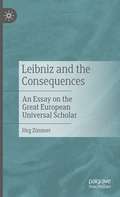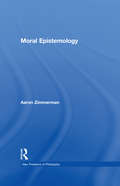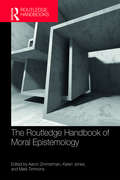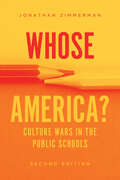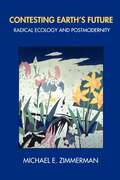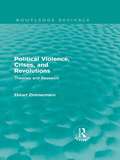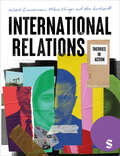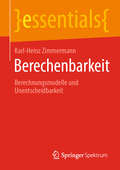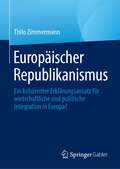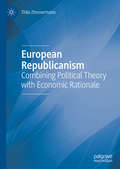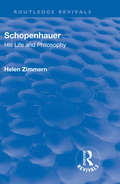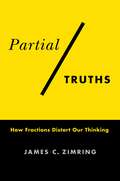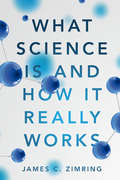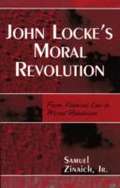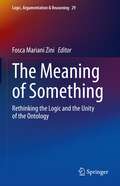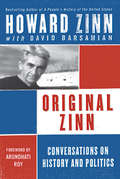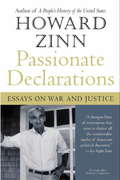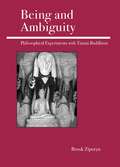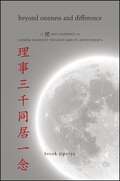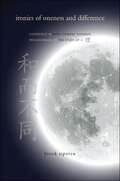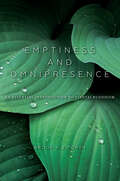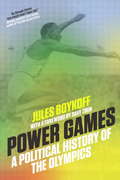- Table View
- List View
Leibniz and the Consequences: An Essay on the Great European Universal Scholar
by Jörg ZimmerLeibniz was probably the last universal scholar in modern times who made original and innovative achievements in all the essential fields of knowledge of his time: as a reform-oriented lawyer, a multilateral thinking diplomat, as a mathematician of infinitesimal calculus, as the inventor of a calculating machine and in the mining of horizontal wind power, as an organizer of science and as one of the first historians who strived for source-critical methodical objectivity. However, this baroque diversity can only be understood from the center of a monadological philosophy, which wants to establish the unity of scientific worldview and metaphysical concept of the world. It is distorted in the classical reception because only Leibniz the Theodicy was known. The topicality of Leibniz today consists in re-exposing the original basic idea of unity in diversity and asking how it can be made fruitful for philosophical and political thought in the 21st century. This book is a translation of the original German 1st edition Leibniz und die Folgen by Jörg Zimmer, published by J.B. Metzler, imprint of Springer-Verlag GmbH, part of Springer Nature in 2018. The translation was done with the help of artificial intelligence (machine translation by the service DeepL.com). A subsequent human revision was done primarily in terms of content, so that the book will read stylistically differently from a conventional translation. Springer Nature works continuously to further the development of tools for the production of books and on the related technologies to support the authors.
Moral Epistemology (New Problems of Philosophy)
by Aaron ZimmermanHow do we know right from wrong? Do we even have moral knowledge? Moral epistemology studies these and related questions about our understanding of virtue and vice. It is one of philosophy’s perennial problems, reaching back to Plato, Aristotle, Aquinas, Locke, Hume and Kant, and has recently been the subject of intense debate as a result of findings in developmental and social psychology. In this outstanding introduction to the subject Aaron Zimmerman covers the following key topics: What is moral epistemology? What are its methods? Including a discussion of Socrates, Gettier and contemporary theories of knowledge skepticism about moral knowledge based on the anthropological record of deep and persistent moral disagreement, including contextualism moral nihilism, including debates concerning God and morality and the relation between moral knowledge and our motives and reasons to act morally epistemic moral scepticism, intuitionism and the possibility of inferring ‘ought’ from ‘is,’ discussing the views of Locke, Hume, Kant, Ross, Audi, Thomson, Harman, Sturgeon and many others how children acquire moral concepts and become more reliable judges criticisms of those who would reduce moral knowledge to value-neutral knowledge or attempt to replace moral belief with emotion. Throughout the book Zimmerman argues that our belief in moral knowledge can survive sceptical challenges. He also draws on a rich range of examples from Plato’s Meno and Dickens’ David Copperfield to Bernard Madoff and Saddam Hussein. Including chapter summaries and annotated further reading at the end of each chapter, Moral Epistemology is essential reading for all students of ethics, epistemology and moral psychology.
The Routledge Handbook of Moral Epistemology (Routledge Handbooks in Philosophy)
by Aaron Zimmerman Karen Jones Mark TimmonsThe Routledge Handbook of Moral Epistemology brings together philosophers, cognitive scientists, developmental and evolutionary psychologists, animal ethologists, intellectual historians, and educators to provide the most comprehensive analysis of the prospects for moral knowledge ever assembled in print. The book’s thirty chapters feature leading experts describing the nature of moral thought, its evolution, childhood development, and neurological realization. Various forms of moral skepticism are addressed along with the historical development of ideals of moral knowledge and their role in law, education, legal policy, and other areas of social life. Highlights include: • Analyses of moral cognition and moral learning by leading cognitive scientists • Accounts of the normative practices of animals by expert animal ethologists • An overview of the evolution of cooperation by preeminent evolutionary psychologists • Sophisticated treatments of moral skepticism, relativism, moral uncertainty, and know-how by renowned philosophers • Scholarly accounts of the development of Western moral thinking by eminent intellectual historians • Careful analyses of the role played by conceptions of moral knowledge in political liberation movements, religious institutions, criminal law, secondary education, and professional codes of ethics articulated by cutting-edge social and moral philosophers.
Whose America?: Culture Wars in the Public Schools
by Jonathan ZimmermanIn this expanded edition of his 2002 book, Zimmerman surveys how battles over public education have become conflicts at the heart of American national identity. Critical Race Theory. The 1619 Project. Mask mandates. As the headlines remind us, American public education is still wracked by culture wars. But these conflicts have shifted sharply over the past two decades, marking larger changes in the ways that Americans imagine themselves. In his 2002 book, Whose America?, Zimmerman predicted that religious differences would continue to dominate the culture wars. Twenty years after that seminal work, Zimmerman has reconsidered: arguments over what American history is, what it means, and how it is taught have exploded with special force in recent years. In this substantially expanded new edition, Zimmerman meditates on the history of the culture wars in the classroom—and on what our inability to find common ground might mean for our future.
Contesting Earth's Future: Radical Ecology and Postmodernity
by Michael E. ZimmermanRadical ecology typically brings to mind media images of ecological activists standing before loggers' saws, staging anti-nuclear marches, and confronting polluters on the high seas. Yet for more than twenty years, the activities of organizations such as the Greens and Earth First! have been influenced by a diverse, less-publicized group of radical ecological philosophers. It is their work—the philosophical underpinnings of the radical ecological movement—that is the subject of Contesting Earth's Future.The book offers a much-needed, balanced appraisal of radical ecology's principles, goals, and limitations. Michael Zimmerman critically examines the movement's three major branches—deep ecology, social ecology, and ecofeminism. He also situates radical ecology within the complex cultural and political terrain of the late twentieth century, showing its relation to Martin Heidegger's anti-technological thought, 1960s counterculturalism, and contemporary theories of poststructuralism and postmodernity.An early and influential ecological thinker, Zimmerman is uniquely qualified to provide a broad overview of radical environmentalism and delineate its various schools of thought. He clearly describes their defining arguments and internecine disputes, among them the charge that deep ecology is an anti-modern, proto-fascist ideology. Reflecting both the movement's promise and its dangers, this book is essential reading for all those concerned with the worldwide ecological crisis.
Political Violence, Crises and Revolutions: Theories and Research (Routledge Revivals)
by Ekkart ZimmermannFirst published in 1983, this extraordinary study provides a comprehensive systematic evaluation of cross-national theorizing and quantitative empirical evidence on four interrelated phenomena: Political violence Crises Military Coups D’ État Revolutions. Findings from social-psychological research on aggression are integrated in this outstanding study, as well as results reported in social-historical studies of revolution. The focus of the book is always on analytical perspectives and corresponding empirical evidence. The author continually highlights the sociostructural and political conditions of political violence, crises and revolutions. This exceptionally detailed and systematic inventory of theories and research on a classic triad of political science (political violence, crises and revolutions) also includes a remarkable bibliography encompassing over 3000 items.
International Relations: Theories in Action
by Hubert Zimmermann Milena Elsinger Alex BurkhardtThe definitive applied theory textbook that helps you make sense of global issues through theoretical concepts. Not presupposing any prior knowledge, this introduction equips you with the skills to use theories as adaptable tools to tackle complex global issues. Adopting a critical and questioning approach, you will be equipped in theory as a series of tools to be used, adapted, combined, and applied when grappling with some of the most contested issues in global politics. Theoretical perspectives are brought alive as a vital tool to understand concrete historical and contemporary examples. This indispensable text starts by examining key theories spanning constructivism and postcolonialism to realism and liberalism with a real-world perspective which prioritises empirical purchase. From here, chapters take a critical, questioning approach to tackle core problems of international politics – from armed conflict and financial markets to the climate crisis, global inequality, gender and race. This text is the ideal companion for all undergraduate and postgraduate students of global affairs. Hubert Zimmermann is Professor of International Relations at Philipps University of Marburg, Germany. Milena Elsinger is Head of the student information department at Philipps University of Marburg, Germany. Alex Burkhardt teaches at the Bundessprachenamt in Koblenz, Germany and previously taught at Philipps University Marburg, Germany.
International Relations: Theories in Action
by Hubert Zimmermann Milena Elsinger Alex BurkhardtThe definitive applied theory textbook that helps you make sense of global issues through theoretical concepts. Not presupposing any prior knowledge, this introduction equips you with the skills to use theories as adaptable tools to tackle complex global issues. Adopting a critical and questioning approach, you will be equipped in theory as a series of tools to be used, adapted, combined, and applied when grappling with some of the most contested issues in global politics. Theoretical perspectives are brought alive as a vital tool to understand concrete historical and contemporary examples. This indispensable text starts by examining key theories spanning constructivism and postcolonialism to realism and liberalism with a real-world perspective which prioritises empirical purchase. From here, chapters take a critical, questioning approach to tackle core problems of international politics – from armed conflict and financial markets to the climate crisis, global inequality, gender and race. This text is the ideal companion for all undergraduate and postgraduate students of global affairs. Hubert Zimmermann is Professor of International Relations at Philipps University of Marburg, Germany. Milena Elsinger is Head of the student information department at Philipps University of Marburg, Germany. Alex Burkhardt teaches at the Bundessprachenamt in Koblenz, Germany and previously taught at Philipps University Marburg, Germany.
Berechenbarkeit: Berechnungsmodelle und Unentscheidbarkeit (essentials)
by Karl-Heinz ZimmermannIn diesem essential werden wesentliche Konzepte der Berechenbarkeitstheorie erörtert. Zunächst werden unterschiedliche Modelle der Berechenbarkeit eingeführt und ihre semantische Gleichwertigkeit gezeigt. Dieses Resultat steht in Einklang mit der Church-Turing-These, nach der jede intuitiv berechenbare Funktion partiell-rekursiv ist. Neben zentralen Instrumenten der Berechenbarkeit, wie etwa der Gödelisierung von berechenbaren Funktionen und der Existenz universeller berechenbarer Funktionen, stehen unentscheidbare Probleme im Fokus, wie etwa das Halteproblem sowie das Wortproblem für die Term-Ersetzung. Semi-entscheidbare Mengen werden beleuchtet und die zentralen Sätze von Rice und Rice-Shapiro werden skizziert.
Europäischer Republikanismus: Ein kohärenter Erklärungsansatz für wirtschaftliche und politische Integration in Europa?
by Thilo ZimmermannIn diesem Buch werden die aktuellen Theorien der europäischen Integration, wie Föderalismus, Neofunktionalismus und liberaler Intergouvernementalismus, mit ihren Stärken und Schwächen vorgestellt. Es wird dann argumentiert, dass die Kombination der republikanischen Theorie mit der Theorie des öffentlichen Gutes, der res publica der öffentlichen Güter, die europäische Integration besser erklären könnte. Die Theorie der öffentlichen Güter muss jedoch übernommen werden, um sie auf den europäischen Republikanismus anwendbar zu machen. Schließlich zeigt das Buch, wie dieser neue Rahmen weitere akademische Debatten beeinflussen kann, z. B. über Souveränität und Währungsintegration, externe Effekte eines gemeinsamen europäischen Marktes und die treibende Kraft der europäischen Integration. Da der republikanische Ansatz nicht einer rein wirtschaftlichen Logik folgt, bleibt Raum für politische Überlegungen und Motivationen. In diesem aktuellen und interdisziplinären Buch verbindet der Autor viele wichtige Stränge der europäischen Integrationstheorie, der Geschichte, der Ökonomie und der Politikwissenschaften, die klar zu einem kohärenten analytischen Diskurs zusammengeführt werden. Seine Stärke liegt in der interdisziplinären Interaktion zwischen Politik und Wirtschaft sowie in theoretischen und praktischen Fragen, die für die öffentliche Debatte in Europa von hoher Relevanz sind. Dieses Buch wird für Wissenschaftler und Studenten von Interesse sein, die sich für wirtschaftliche Integration sowie für Geschichte und politische Philosophie interessieren.
European Republicanism: Combining Political Theory with Economic Rationale
by Thilo ZimmermannThis book presents current theories of European integration, such as federalism, neo-functionalism and liberal intergovernmentalism with their strengths and weaknesses. It is then argued that the combination of republican theory with public good theory, the res publica of public goods, could better explain European integration. Public good theory has, however, to be adopted in order to make it applicable to European republicanism. Finally, the book demonstrates how this new framework can influence further academic debates, such as on sovereignty and monetary integration, externalities of a common European market and the driving force of European integration. It is maintained that as the republican approach does not follow a pure economic logic, there remains space for political considerations and motivations.In this topical and interdisciplinary book, the author combines many important strings of European integration theory, history, economics and political sciences, which are clearly brought together into a coherent analytical discourse. Its strength is the interdisciplinary interaction between politics and economics, as well as theoretical and practical issues which are of high relevance for public debate in Europe. This book will be of interest to scholars and students interested in economic integration, as well as history and political philosophy.
Revival: His Life And His Philosophy (Routledge Revivals)
by Helen ZimmernIn the following pages are outlined the Life and Philosophy of one of the most original and picturesque intellectual giants of our age. For while Schopenhauer offers marked analogies to Johnson, Rousseau and Byron, and yields in interest to none of them, he was at the same time a man of absolutely unique mould.
Partial Truths: How Fractions Distort Our Thinking
by James C. ZimringA fast-food chain once tried to compete with McDonald’s quarter-pounder by introducing a third-pound hamburger—only for it to flop when consumers thought a third pound was less than a quarter pound because three is less than four. Separately, a rash of suicides by teenagers who played Dungeons and Dragons caused a panic in parents and the media. They thought D&D was causing teenage suicides—when in fact teenage D&D players died by suicide at a much lower rate than the national average. Errors of this type can be found from antiquity to the present, from the Peloponnesian War to the COVID-19 pandemic. How and why do we keep falling into these traps?James C. Zimring argues that many of the mistakes that the human mind consistently makes boil down to misperceiving fractions. We see slews of statistics that are essentially fractions, such as percentages, probabilities, frequencies, and rates, and we tend to misinterpret them. Sometimes bad actors manipulate us by cherry-picking data or distorting how information is presented; other times, sloppy communicators inadvertently mislead us. In many cases, we fool ourselves and have only our own minds to blame. Zimring also explores the counterintuitive reason that these flaws might benefit us, demonstrating that individual error can be highly advantageous to problem solving by groups. Blending key scientific research in cognitive psychology with accessible real-life examples, Partial Truths helps readers spot the fallacies lurking in everyday information, from politics to the criminal justice system, from religion to science, from business strategies to New Age culture.
What Science Is and How It Really Works
by James C. ZimringScientific advances have transformed the world. However, science can sometimes get things wrong, and at times, disastrously so. Understanding the basis for scientific claims and judging how much confidence we should place in them is essential for individual choice, societal debates, and development of public policy and laws. We must ask: what is the basis of scientific claims? How much confidence should we put in them? What is defined as science and what is not? This book synthesizes a working definition of science and its properties, as explained through the eyes of a practicing scientist, by integrating advances from philosophy, psychology, history, sociology, and anthropology into a holistic view. Crucial in our political climate, the book fights the myths of science often portrayed to the public. Written for a general audience, it also enables students to better grasp methodologies and helps professional scientists to articulate what they do and why.
John Locke's Moral Revolution: From Natural Law to Moral Relativism
by Samuel Zinaich JrJohn Locke's Moral Revolution critiques two traditional approaches to John Locke's philosophy. The first approach interprets John Locke as committed to justifying his early his early Christian / Aristotelian views of the law of nature. The second approach sees Locke attempting to manage a cluster of inconsistent moral views. In this new work, author Samuel Zinaich, Jr. argues that Locke attempts to establish a solid underpinning for religious, moral, and political ideas upon the philosophy of corpuscularism.
The Meaning of Something: Rethinking the Logic and the Unity of the Ontology (Logic, Argumentation & Reasoning #29)
by Fosca Mariani ZiniThis innovative volume investigates the meaning of ‘something’ in different recent philosophical traditions in order to rethink the logic and the unity of ontology, without forgetting to compare these views to earlier significative accounts in the history of philosophy. In fact, the revival of interest in “something” in the 19th and 20th centuries as well as in contemporary philosophy can easily be accounted for: it affords the possibility for asking the question: what is there? without engaging in predefined speculative assumptions The issue about “something” seems to avoid any naive approach to the question about what there is, so that it is treated in two main contemporary philosophical trends: “material ontology”, which aims at taking “inventory” of what there is, of everything that is; and “formal ontology”, which analyses the structural features of all there is, whatever it is. The volume advances cutting-edge debates on what is the first et the most general item in ontology, that is to say “something”, because the relevant features of the conceptual core of something are: non-nothingness, otherness. Something means that one being is different from others. The relationality belongs to something.: Therefore, the volume advances cutting-edge debates in phenomenology, analytic philosophy, formal and material ontology, traditional metaphysics.
Original Zinn: Conversations on History and Politics
by Howard ZinnHistorian, activist, and bestselling author Howard Zinn has been interviewed by David Barsamian for public radio numerous times over the past decade. Original Zinn is a collection of their conversations, showcasing the acclaimed author of A People's History of the United States at his most engaging and provocative.Touching on such diverse topics as the American war machine, civil disobedience, the importance of memory and remembering history, and the role of artists--from Langston Hughes to Dalton Trumbo to Bob Dylan--in relation to social change, Original Zinn is Zinn at his irrepressible best, the acute perception of a scholar whose impressive knowledge and probing intellect make history immediate and relevant for us all.
Passionate Declarations: Essays on War and Justice
by Howard ZinnFrom the bestselling author of A People's History of the United States comes this selection of passionate, honest, and piercing essays looking at American political ideology. Howard Zinn brings to Passionate Declarations the same astringent style and provocative point of view that led more than a million people to buy his book A People's History of the United States. He directs his critique here to what he calls "American orthodoxies" -- that set of beliefs guardians of our culture consider sacrosanct: justifications for war, cynicism about human nature and violence, pride in our economic system, certainty of our freedom of speech, romanticization of representative government, confidence in our system of justice. Those orthodoxies, he believes, have a chilling effect on our capacity to think independently and to become active citizens in the long struggle for peace and justice.
Being and Ambiguity: Philosophical Experiments with Tiantai Buddhism
by Brook ZiporynBeing and Ambiguity is a brilliant work of philosophy, filled with insights, jokes, and topical examples. <P><P>Professor Ziporyn draws on the works of such Western thinkers as Wittgenstein, Nietzsche, Freud, Sartre, and Hegel, but develops his main argument from Tiantai school of Chinese Buddhism. This important work introduces Tiantai Buddhism to the reader and demonstrates its relevance to profound philosophical issues.Ziporyn argues that we can make both of the claims below simultaneously:This book is about everything. It contains the answers to all philosophical problems which ever shall exist. This book is all claptrap. It is completely devoid of objective validity of any kind.These claims are not contradictory. Rather, they state the same thing in two different ways. To be objective truth is to be subjective claptrap, and vise versa. All interchanges of any kind - conversations, daydreams, sensations - are not only about something but also about everything.Thus, this book concerns itself with no less than the nature of what is and what it means for something to be what it is. It provides a new approach to the basic Western philosophical and psychological issues of identity, determinacy, being, desire, boredom, addiction, love and truth.ems identified, investigated, and resolved-resolved at least in a manner that measures up to the title: Being and Amibguity. But whether it's being or non-being that bothers you, this book has your number, your 'social security' number to be exact, since one of the subtle charms (terrors?) of this book is its commitment to drive philosophy through the carwash of mundane reality, soaking the big German/Buddhist topics in the hot-again-cold-again Real of being-for-the-Other, and the numberless other harrowing tasks that normal life requires. A must read for anyone interested in metaphysical sodomy."-Alan Cole, Author of Text as Father: Paternal Seductions in Early Mahayana Buddhist Literature"Ziporyn carries out an audacious though experiment whose starting point lies in the classical Tiantai idea that being is fundamentally ambiguous. If this idea is valid, he argues, then no philosophical statement can be profound without being vapid. Fully embracing this implication, Ziporyn leads the reader on a fascinating adventure in which Kant, Hegel, Nietzsche, Freud, Heidegger, and many others are seen through the lens of Neo-Tiantai ethics."-Andrew Cutrofello, Author of The Owl at Dawn: A Sequel to Hegel's Phenomenology of Spirit
Beyond Oneness and Difference: Li and Coherence in Chinese Buddhist Thought and Its Antecedents (SUNY series in Chinese Philosophy and Culture)
by Brook ZiporynBeyond Oneness and Difference considers the development of one of the key concepts of Chinese intellectual history, Li. A grasp of the strange history of this term and its seemingly conflicting implications—as oneness and differentiation, as the knowable and as what transcends knowledge, as the good and as the transcendence of good and bad, as order and as omnipresence—raises questions about the most basic building blocks of our thinking. This exploration began in the book's companion volume, Ironies of Oneness and Difference, which detailed how formative Confucian and Daoist thinkers approached and demarcated concepts of coherence, order, and value, identifying both ironic and non-ironic trends in the elaboration of these core ideas. In the present volume, Brook Ziporyn goes on to examine the implications of Li as they develop in Neo-Daoist metaphysics and in Chinese Buddhism, ultimately becoming foundational to Song and Ming dynasty Neo-Confucianism, the orthodox ideology of late imperial China. Ziporyn's interrogation goes beyond analysis to reveal the unsuspected range of human thinking on these most fundamental categories of ontology, metaphysics, epistemology, and ethics.
Ironies of Oneness and Difference: Coherence in Early Chinese Thought; Prolegomena to the Study of Li (SUNY series in Chinese Philosophy and Culture)
by Brook ZiporynProviding a bracing expansion of horizons, this book displays the unsuspected range of human thinking on the most basic categories of experience. The way in which early Chinese thinkers approached concepts such as one and many, sameness and difference, self and other, and internal and external stand in stark contrast to the way parallel concepts entrenched in much of modern thinking developed in Greek and European thought. Brook Ziporyn traces the distinctive and surprising philosophical journeys found in the works of the formative Confucian and Daoist thinkers back to a prevailing set of assumptions that tends to see questions of identity, value, and knowledge—the subject matter of ontology, ethics, and epistemology in other traditions—as all ultimately relating to questions about coherence in one form or another. Mere awareness of how many different ways human beings can think and have thought about these categories is itself a game changer for our own attitudes toward what is thinkable for us. The actual inhabitation and mastery of these alternative modes of thinking is an even greater adventure in intellectual and experiential expansion.
Emptiness and Omnipresence: An Essential Introduction to Tiantai Buddhism (World Philosophies Ser.)
by Brook A. ZiporynTiantai Buddhism emerged from an idiosyncratic and innovative interpretation of the Lotus Sutra to become one of the most complete, systematic, and influential schools of philosophical thought developed in East Asia. Brook A. Ziporyn puts Tiantai into dialogue with modern philosophical concerns to draw out its implications for ethics, epistemology, and metaphysics. Ziporyn explains Tiantai's unlikely roots, its positions of extreme affirmation and rejection, its religious skepticism and embrace of religious myth, and its view of human consciousness. Ziporyn reveals the profound insights of Tiantai Buddhism while stimulating philosophical reflection on its unexpected effects.
Power Games: A Political History of the Olympics
by Dave Zirin Jules BoykoffA timely, no-holds barred, critical political history of the modern Olympic GamesThe Olympics have a checkered, sometimes scandalous, political history. Jules Boykoff, a former US Olympic team member, takes readers from the event's nineteenth-century origins, through the Games' flirtation with Fascism, and into the contemporary era of corporate control. Along the way he recounts vibrant alt-Olympic movements, such as the Workers' Games and Women's Games of the 1920s and 1930s as well as athlete-activists and political movements that stood up to challenge the Olympic machine.From the Trade Paperback edition.
Environmental Practice and Early American Literature
by Michael ZiserThis original and provocative study tells the story of American literary history from the perspective of its environmental context. Weaving together close readings of early American texts with ecological histories of tobacco, potatoes, apples, and honey bees, Michael Ziser presents a method for literary criticism that explodes the conceptual distinction between the civilized and natural world. Beginning with the English exploration of Virginia in the sixteenth century, Ziser argues that the settlement of the "New World" - and the cultivation and exploitation of its bounty - dramatically altered how writers used language to describe the phenomena they encountered on the frontier. Examining the work of Harriot, Grainger, Cooper, Thoreau and others, Ziser reveals how these authors, whether consciously or not, transcribed the vibrant ecology of North America, and the ways that the environment helped codify a uniquely American literary aesthetic of lasting importance.
